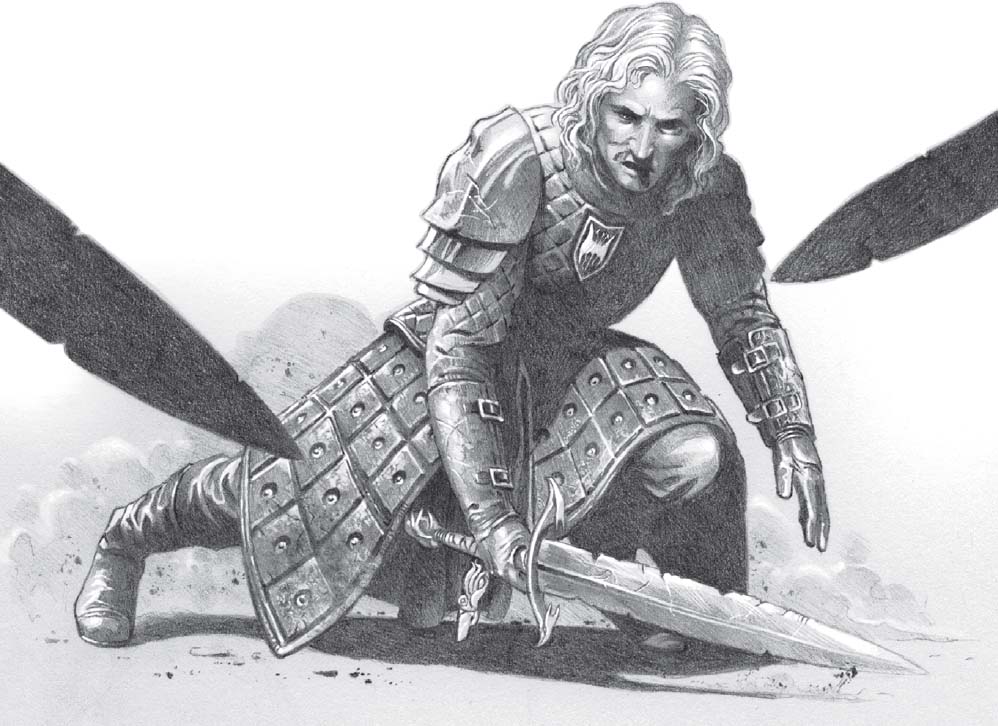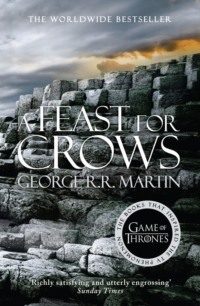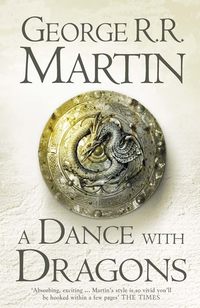
Полная версия
Jaehaerys was aware of his own shortcomings too—shortcomings he intended to rectify before he sat the Iron Throne. His father, King Aenys, had been slighted as weak, in part because he was not the warrior that his brother Maegor was. Jaehaerys was determined that no man would ever question his own courage or skill at arms. On Dragonstone he had Ser Merrell Bullock, commander of the castle garrison, his sons Ser Alyn and Ser Howard, a seasoned master-at-arms in Ser Elyas Scales, and his own Seven, the finest fighters in the realm. Every morning Jaehaerys trained with them in the castle yard, shouting at them to come at him harder, to press him, harry him, and attack him in every way they knew. From sunrise till noon he worked with them, honing his skills with sword and spear and mace and axe whilst his new queen looked on.
It was a hard and brutal regimen. Each bout ended only when the king himself or his opponent declared him dead. Jaehaerys died so often that the men of the garrison made a game of it, shouting “The king is dead” every time he fell, and “Long live the king” when he struggled to his feet. His foes began a contest, wagering with one another to see which of them could kill the king the most. (The victor, we are told, was young Ser Pate the Woodcock, whose darting spear purportedly gave His Grace fits.) Jaehaerys was oft bruised and bloody by evening, to Alysanne’s distress, but his prowess improved so markedly that near the end of his time on Dragonstone, old Ser Elyas himself told him, “Your Grace, you will never be a Kingsguard, but if by some sorcery your uncle Maegor himself were to rise from the grave, my coin would be on you.”
One evening, after a day in which Jaehaerys had been severely tested and battered, Maester Culiper said to him, “Your Grace, why do you punish yourself so harshly? The realm is at peace.”The young king only smiled and replied, “The realm was at peace when my grandsire died, but scarcely had my father climbed onto the throne than foes rose up on every side. They were testing him, to learn if he was strong or weak. They will test me as well.”

He was not wrong, though his first trial, when it came, was to be of a very different nature, one that no amount of training in the yards of Dragonstone could possibly have prepared him for. For it was his worth as a man, and his love for his little queen, that were to be put to the test.
We know very little about the childhood of Alysanne Targaryen; as the fifthborn child of King Aenys and Queen Alyssa, and a female, observers at court found her of less interest than her older siblings who stood higher in the line of succession. From what little has come down to us, Alysanne was a bright but unremarkable girl; small but never sickly, courteous, biddable, with a sweet smile and a pleasing voice. To the relief of her parents, she displayed none of the timidity that had afflicted her elder sister, Rhaena, as a small child. Neither did she exhibit the willful and stubborn temperament of Rhaena’s daughter Aerea.
As a princess of the royal household, Alysanne would of course have had servants and companions from an early age. As an infant certainly she would have had a wet nurse; like most noble women, Queen Alyssa did not give suck to her own children. Later a maester would have taught her to read and write and do sums, and a septa would have instructed her in piety, deportment, and the mysteries of the Faith. Girls of common birth would have served as her maids, washing her clothing and emptying her chamberpot, and in good time she would certainly have taken ladies of a like age and noble blood as companions, to ride and play and sew with.
Alysanne did not choose these companions for herself; they were selected for her by her mother, Queen Alyssa, and they came and went with some frequency, to ascertain that the princess did not grow too fond of any of them. Her sister Rhaena’s penchant for showering an unseemly amount of affection and attention on a succession of favorites, some of whom were considered less than suitable, had been the source of much whispering at court, and the queen did not want Alysanne to be the subject of similar rumors.
All this changed when King Aenys died on Dragonstone and his brother, Maegor, returned from across the narrow sea to seize the Iron Throne. The new king had little love and less trust for any of his brother’s children, and he had his mother, the Dowager Queen Visenya, to enforce his will. Queen Alyssa’s household knights and servants were dismissed, together with the servants and companions of her children, and Jaehaerys and Alysanne were made wards of their great-aunt, the fearsome Visenya. Hostages in all but name, they spent their uncle’s reign being shuttled between Driftmark, Dragonstone, and King’s Landing at the will of others, until Visenya’s death in 44 AC offered Queen Alyssa an opportunity to escape, a chance she seized with alacrity, fleeing Dragonstone with Jaehaerys, Alysanne, and the blade Dark Sister.
No reliable accounts of Princess Alysanne’s life after the escape survive to this day. She does not appear again in the annals of the realm until the final days of Maegor’s bloody reign, when her mother and Lord Rogar rode forth from Storm’s End at the head of an army, whilst Alysanne, Jaehaerys, and their sister, Rhaena, descended on King’s Landing with their dragons.
Undoubtedly Princess Alysanne had handmaids and companions in the days that followed Maegor’s death. Their names and particulars have not come down to us, unfortunately. We do know that none of them came with the princess when she and Jaehaerys fled the Red Keep on their dragons. Aside from the seven knights of the Kingsguard and the castle garrison, cooks, stablehands, and other servants, the king and his bride were unattended on Dragonstone.
That was hardly proper for a princess, let alone for a queen. Alysanne must have her household, and in that her mother, Alyssa, saw an opportunity to undermine, and mayhaps undo, her marriage. The Queen Regent resolved to dispatch to Dragonstone a carefully selected company of companions and servants to see to the young queen’s needs. The plan, Grand Maester Benifer assures us, was Queen Alyssa’s … but it was one that Lord Rogar assented to gladly, for he saw at once a way to twist it to his own ends.
The aged Septon Oswyck, who had performed the wedding rites for Jaehaerys and Alysanne, kept the sept on Dragonstone, but a young lady of royal birth required one of her own sex to see to her religious instruction. Queen Alyssa sent three; the formidable Septa Ysabel, and two well-born novices of Alysanne’s own age, Lyra and Edyth. To take charge of the serving girls and maids of Alysanne’s household, she dispatched Lady Lucinda Tully, the wife of the Lord of Riverrun, whose fierce piety was renowned through all the land. With her came her younger sister, Ella of House Broome, a modest maid whose name had briefly been offered as a match for Jaehaerys. Lord Celtigar’s daughters, so recently scorned by the Hand as being chinless, breastless, and witless, were included as well. (“We had as well get some use of them,” Lord Rogar supposedly told their father.) Three other girls of noble birth made up the remainder of the company, one each from the Vale, the stormlands, and the Reach: Jennis of House Templeton, Coryanne of House Wylde, and Rosamund of House Ball.
Queen Alyssa wanted her daughter attended by suitable companions of her own age and station, no doubt, but that was not her sole motivation in sending these ladies to Dragonstone. Septa Ysabel, the novices Edyth and Lyra, and the deeply pious Lady Lucinda and her sister had a further charge. It was the hope of the Queen Regent that these fiercely righteous women might impress upon Alysanne, and mayhaps even Jaehaerys, that for brother to lie with sister was an abomination in the eyes of the Faith. “The children” (as Alyssa persisted in calling the king and queen) were not evil, only young and willful; suitably instructed, they might see the error of their ways and repent their marriage before it tore the realm apart. Or so she prayed.
Lord Rogar’s motives were baser. Unable to rely on the loyalty of the castle garrison or the knights of the Kingsguard, the Hand needed eyes and ears on Dragonstone. All that Jaehaerys and Alysanne said and did was to be reported back to him, he made clear to Lady Lucinda and the others. He was especially anxious to learn if and when the king and queen intended on consummating their marriage. That, he stressed, must be prevented.
And mayhaps there was more.
And now unfortunately we must give some consideration to a certain distasteful book that first appeared in the Seven Kingdoms some forty years after the events presently being discussed. Copies of this book still pass from hand to hand in the low places of Westeros, and may oft be found in certain brothels (those catering to patrons able to read) and the libraries of men of low morals, where they are best kept under lock and key, hidden from the eyes of maidens, goodwives, children, and the chaste and pious.
The book in question is known under various titles, amongst them Sins of the Flesh, The High and the Low, A Wanton’s Tale, and The Wickedness of Men, but all versions bear the subtitle A Caution for Young Girls. It purports to be the testimony of a young maid of noble birth who surrendered her virtue to a groom in her lord father’s castle, gave birth to a child out of wedlock, and thereafter found herself partaking of every sort of wickedness imaginable during a long life of sin, suffering, and slavery.
If the author’s tale is true (parts of it strain credulity), during the course of her life she found herself a handmaid to a queen, the paramour of a young knight, a camp follower in the Disputed Lands of Essos, a serving wench in Myr, a mummer in Tyrosh, the plaything of a corsair queen in the Basilisk Isles, a slave in Old Volantis (where she was tattooed, pierced, and ringed), the handmaid of a Qartheen warlock, and finally the mistress of a pleasure house in Lys … before ultimately returning to Oldtown and the Faith. Purportedly she ended her life as a septa in the Starry Sept, where she set down this story of her life to warn other young maids not to do as she had done.
The lascivious details of the author’s erotic adventures need not concern us here. Our only interest is in the early part of her sordid tale, the story of her youth … for the alleged author of A Caution for Young Girls is none other than Coryanne Wylde, one of the girls sent to Dragonstone as a companion to the little queen.
We have no way to ascertain the veracity of her story, nor even whether she was in truth the author of this infamous book (some argue plausibly that the text is the product of several hands, for the style of the prose varies greatly from episode to episode). Lady Coryanne’s early history, however, is confirmed in the accounts of the maester who served at the Rain House during her youth. At the age of thirteen, he records, Lord Wylde’s younger daughter was indeed seduced and deflowered by a “surly lad” from the stables. In A Caution for Young Girls, this lad is described as a handsome boy her own age, but the maester’s account differs, painting the seducer as a pox-scarred varlet of thirty years distinguished only by a “male member as stout as a stallion’s.”
Whatever the truth, the “surly lad” was gelded and sent to the Wall as soon as his deed was known, whilst Lady Coryanne was confined to her chambers to give birth to his baseborn son. The boy was sent away soon after birth, to Storm’s End, where he would be fostered by one of the castle stewards and his barren wife.
The bastard boy was born in 48 AC, according to the maester’s journals. Lady Coryanne was carefully watched afterward, but few beyond the walls of the Rain House knew of her shame. When the raven came to summon her to King’s Landing, her lady mother told her sternly that she was never to speak of her child or her sin. “In the Red Keep, they will take you for a maiden.” But as the girl made her way to the city, escorted by her father and a brother, they stopped for the night at an inn on the south bank of the Blackwater Rush, beside the ferry landing. There she found a certain great lord awaiting her arrival.
And here the tale grows even more tangled, for the identity of the man at the inn is a matter of some dispute, even amongst those who accept A Caution for Young Girls to contain a modicum of truth.
Over the years and centuries, as the book was copied and recopied, many changes and emendations crept into the text. The maesters who labor at the Citadel copying books are rigorously trained to reproduce the original word for word, but few mundane scribes are so disciplined. Such septons, septas, and holy sisters as copy and illuminate books for the Faith oft strike out or alter any passages they believe to be offensive, obscene, or theologically unsound. As virtually the whole of A Caution for Young Girls is obscene, it was not like to have been transcribed by either maesters or septons. Given the number of copies known to exist (hundreds, though as many more were burned by Baelor the Blessed), the scribes responsible were most likely septons expelled from the Faith for drunkenness, theft, or fornication, failed students who left the Citadel without a chain, hired quills from the Free Cities, or mummers (the worst of all). Lacking the rigor of maesters, such scribes oft feel free to “improve” on the texts they are copying. (Mummers in particular are prone to this.)
In the case of A Caution for Young Girls, such “improvements” largely consisted of adding ever more episodes of depravity and changing the existing episodes to make them even more disturbing and lascivious. As alteration followed alteration over the years, it became ever more difficult to ascertain which was the original text, to the extent that even maesters at the Citadel cannot agree as to the title of the book, as has been noted. The identity of the man who met Coryanne Wylde in the inn by the ferry, if indeed such a meeting ever took place, is another matter of contention. In the copies entitled Sins of the Flesh and The High and the Low (which tend to be the older versions, and the shortest), the man at the inn is identified as Ser Borys Baratheon, eldest of Lord Rogar’s four brothers. In A Wanton’s Tale and The Wickedness of Men, however, the man is Lord Rogar himself.
All these versions agree on what happened next. Dismissing Lady Coryanne’s father and brother, the lord commanded the girl to disrobe so he might inspect her. “He ran his hands over every part of me,” she wrote, “and bade me turn this way and that and bend and stretch and open my legs to his gaze, until at last he pronounced himself satisfied.” Only then did the man reveal the purpose of the summons that had brought her to King’s Landing. She was to be sent to Dragonstone, a supposed maid, to serve as one of Queen Alysanne’s companions, but once there she was to use her wiles and her body to beguile the king into bed.
“Jaehaerys is a man-maid like as not, and besotted with his sister,” this man supposedly told her, “but Alysanne is but a child and you are a woman any man would want. Once His Grace tastes your charms he may come to his senses and abandon this folly of a marriage. He may even choose to keep you afterward, who can say? There can be no question of marriage, of course, but you would have jewels, servants, whatever you might want. There are rich rewards in being a king’s bedwarmer. If Alysanne should discover you abed together, so much the better. She is a prideful girl and would be quick to abandon an unfaithful spouse. And if you should get with child again, you and the babe would be well taken care of, and your father and mother will be richly rewarded for your service to the Crown.”[2]
Can we put any credence in this tale? At this late date, so far removed from the events in question, with all the principals long dead, there is no way to be certain. Beyond the testimony of the girl herself, we have no source to verify that this meeting by the ferry ever took place. And if some Baratheon did indeed meet privily with Coryanne Wylde before she reached King’s Landing, we cannot know what words he might have spoken to her. He could as easily have simply been instructing her in her duties as a spy and tattle, as the other girls had been instructed.
Archmaester Crey, writing at the Citadel in the last years of King Jaehaerys’s long reign, believed that the meeting at the inn was a clumsy calumny intended to blacken the name of Lord Rogar, and went so far as to attribute the lie to Ser Borys Baratheon himself, who quarreled bitterly with his brother in later life. Other scholars, including Maester Ryben, the Citadel’s foremost expert on banned, forbidden, fraudulent, and obscene texts, put the story down as no more than a bawdy tale of the sort known to excite the lust of young boys, bastards, whores, and the men who partake of their favors. “Amongst the smallfolk there are always men of a lascivious character who delight in tales of great lords and noble knights despoiling maidens,” Ryben wrote, “for this persuades them that their betters share their own base lusts.”
Mayhaps. Yet there are certain things that we do know beyond a doubt that may allow us to draw our own conclusions. We do know that the younger daughter of Morgan Wylde, Lord of the Rain House, was deflowered at an early age and gave birth to a bastard boy. We can be reasonably certain that Lord Rogar knew of her shame; not only was he Lord Morgan’s liege, but the child was placed in his own household. We know that Coryanne Wylde was amongst the maids who were sent to Dragonstone as companions for Queen Alysanne … a singularly curious choice, if a lady-in-waiting was all she was meant to be, for scores of other young girls of noble birth and suitable age were also available, girls whose maidenheads were intact and whose virtue was beyond reproach.
“Why her?” many have asked in the years since. Did she have some special gift, some particular charm? If so, no one remarked on it at the time. Could Lord Rogar or Queen Alyssa have been indebted to her lord father or lady mother for some past favor or kindness? We have no record of it. No plausible explanation for the selection of Coryanne Wylde has ever been offered, save for the simple, ugly answer proferred by A Caution for Young Girls: she was sent to Dragonstone not for Alysanne, but for Jaehaerys.[3]
Court records indicate that Septa Ysabel, Lady Lucinda, and the other women chosen for Alysanne Targaryen’s household boarded the trading galley Wise Woman at dawn on the seventh day of the second moon of 50 AC, and left for Dragonstone on the morning tide. Queen Alyssa had sent word of their coming ahead by raven, yet even so she had some concern that the Wise Women, as they became known from that day forth, would find the gates of Dragonstone closed to them. Her fears were unfounded. The little queen and two Kingsguard met them at the harbor as they disembarked, and Alysanne welcomed each of them with glad smiles and gifts.
Before we relate what happened afterward, let us turn our gaze briefly to Fair Isle, where Rhaena Targaryen, the “Queen in the West,” resided with her new husband and a court of her own.
It will be recalled that Queen Alyssa had been no more pleased by her eldest daughter’s third marriage than by the one her son would soon make, though Rhaena’s marriage was of less consequence. She was not alone in this, for in truth Androw Farman was a curious choice for one with the blood of the dragon in her veins.
The second son of Lord Farman, not even the heir, Androw was said to be a handsome boy with pale blue eyes and long flaxen hair, but he was nine years younger than the queen, and even at his own father’s court there were those who scorned him as “half a girl” himself, for he was soft of speech and gentle of nature. A singular failure as a squire, he had never become a knight, having none of the martial skills of his lord father and elder brother. For a time, his sire had considered sending him to Oldtown to forge a maester’s chain, until his own maester told him that the boy was simply not clever enough, and could hardly read nor write. Later, when asked why she had chosen such an unpromising spouse, Rhaena Targaryen replied, “He was kind to me.”
Androw’s father had been kind to her as well, offering her refuge on Fair Isle after the Battle Beneath the Gods Eye, when her uncle, King Maegor, was demanding her capture and the Poor Fellows of the realm were denouncing her as a vile sinner and her daughters as abominations. Some have put forward the suggestion that the widowed queen took Androw for her husband in part to repay his father for that kindness, for Lord Farman, himself a second son who had never expected to rule, was known to have great fondness for Androw, despite his deficiencies. Mayhaps there is some truth in that assertion, but another possibility, first put forward by Lord Farman’s maester, may cut closer to the bone. “The queen found her true love on Fair Isle,” Maester Smike wrote to the Citadel, “not with Androw, but with his sister, Lady Elissa.”
Three years Androw’s elder, Elissa Farman shared her brother’s blue eyes and long flaxen hair, but elsewise she was as unlike him as a sibling could be. Sharp of wit and sharper of tongue, she loved horses, dogs, and hawks. She was a fine singer and a skilled archer, but her great love was sailing. The Wind Our Steed were the words of the Farmans of Fair Isle, who had sailed the western seas since the Dawn Age, and Lady Elissa embodied them. As a child, it was said that she spent more time at sea than upon the land. Her father’s crews used to laugh to see her climbing the rigging like a monkey. She sailed her own boat around Fair Isle at the age of four-and-ten, and by the time she was twenty she had voyaged as far north as Bear Island and as far south as the Arbor. Ofttimes, to the horror of her lord father and lady mother, she spoke of her desire to take a ship beyond the western horizon to learn what strange and wondrous lands might lie on the far side of the Sunset Sea.
Lady Elissa had been twice betrothed, once at twelve and once at sixteen, but she had frightened off both boys, as her own father admitted ruefully. In Rhaena Targaryen, however, she found a like-minded companion, and in her the queen found a new confidant. Together with Alayne Royce and Samantha Stokeworth, two of Rhaena’s oldest friends, they became nigh inseparable, a court within the court that Ser Franklyn Farman, Lord Marq’s elder son, dubbed “the Four-Headed Beast.” Androw Farman, Rhaena’s new husband, was admitted to their circle from time to time, but never so often as to be taken for a fifth head. Most tellingly, Queen Rhaena never took him flying with her on the back of her dragon, Dreamfyre, an adventure she shared frequently with the ladies Elissa, Alayne, and Sam (in fairness, it is more than possible that the queen invited Androw to share the sky with her only to have him decline, for he was not of an adventurous disposition).
It would be a mistake to regard Queen Rhaena’s time at Faircastle as an idyll, however. Not everyone welcomed her presence, by any means. Even here on this distant isle there were Poor Fellows, angered that Lord Marq, like his father before him, had given support and sanctuary to one they regarded as an enemy of the Faith. The continued presence of Dreamfyre on the island was also creating problems. Glimpsed every few years, a dragon was a wonder and a terror to behold, and it was true that some of the Fair Islanders took pride in having “a dragon of our own.” Others, however, were made anxious by the presence of the great beast, especially as she grew larger … and hungrier. Feeding a growing dragon is no small thing. And when it became known that Dreamfyre had produced a clutch of dragon eggs, a begging brother from the inland hills began to preach that Fair Isle would soon be overrun by dragons “devouring sheep and cows and men alike,” unless a dragonslayer came forth to put an end to the scourge. Lord Farman sent forth knights to seize the man and silence him, but not before thousands had heard his prophecies. Though the preacher died in the dungeons under Faircastle, his words lived on, filling the ignorant with fear wherever they were heard.








